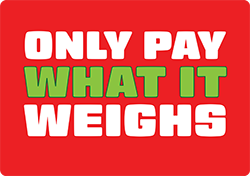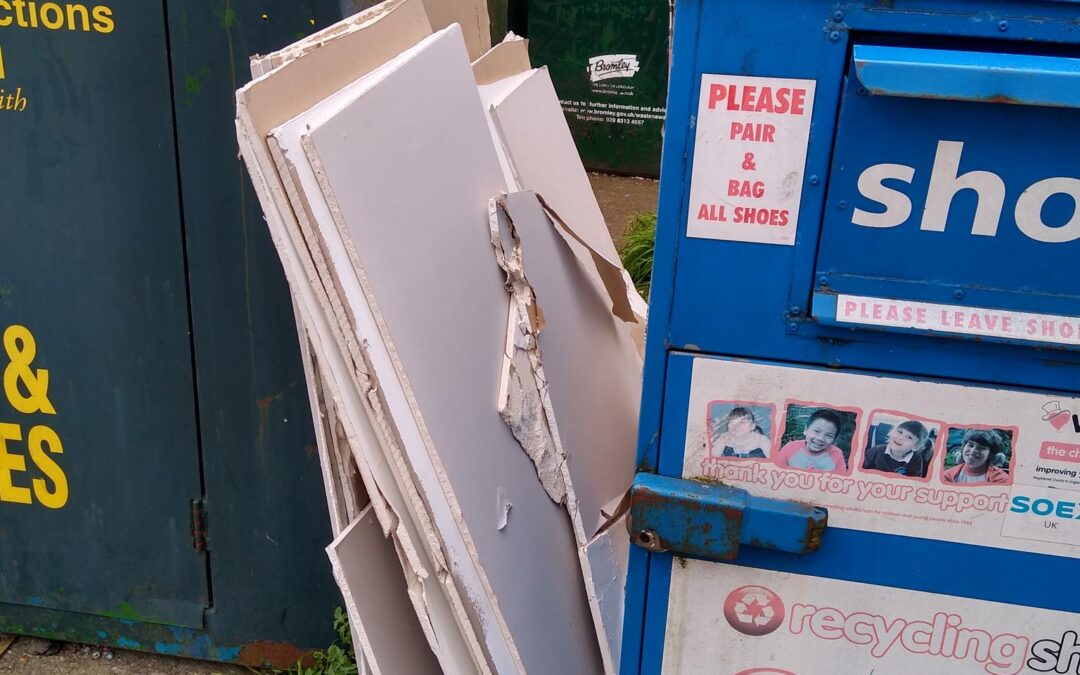If you look at the BBC website, under the category ‘fly-tipping‘, you can read story after story, after story, on the topic.
In the run up to today’s date – 26 April 2024 – there were stories on fly-tipping around the UK, most of them concerning examples of it, on 23 April, then 19, 18, 17 (two), 16, 15 (two), 12, 9, 3, and 2 April. Even for just one, major, news outlet this is a lot of stories, Too many.
Some of the stories relate to increased penalties for fly-tipping. One is about an incompetent fly-tipper:
“A fly-tipper was caught on CCTV dragging a washing machine along a path before trying to shove it into some bushes near his home. The man was filmed struggling with the appliance on Hurleybrook Way in Leegomery, Telford, while looking around to make sure he was not being watched. At one point he walked away before returning with a part that he tried and failed to re-attach to the machine. Telford and Wrekin Council said the man was tracked down and fined £1,000 for the incident, which took place on 3 March.”
Some are about the kinds of goods dumped, such as this story, “False teeth, crutches, a toilet, bolt cutters and a DVLA wheel clamp are among items found by a group of volunteers.”

Let’s just recap a little on the basics. The Metropolitan Police says on its website:
“Fly-tipping and littering covers a range of items that people might discard in a public place, from large appliances like fridges to drugs-related paraphernalia like needles and syringes. Find out more below, including what you can do to help clean up your community.
“While the police will take action if we witness it happening, littering should usually be reported to your local council as they can organise the removal of litter. General littering includes the dumping of household rubbish, either in plastic bags or as individual items. It also includes dog fouling in public places.
“Fly-tipping is the illegal dumping of large items or waste on public roads, land or into rivers. This could include large household appliances like washing machines or discarded materials from construction sites.
“Equipment used for taking drugs, discarded drugs and items used during sex, such as condoms, represent a serious health risk to the general public. Your local council will want to remove these and make the area safe.
“Fly-tipping and littering can be a health hazard, not to mention an eyesore. It can cause unpleasant smells, attract pests and create a dangerous environment for children, pets and wildlife in particular. We’ve found that if the problem is not dealt with quickly, it can lead to an increase in fly-tipping in the area, making the unpleasant and unsafe area even larger and more obvious. If you’ve witnessed littering or people leaving a mess in public, please don’t attempt to remove the rubbish yourself in case there are hidden sharp or dangerous items. Contact your local council who will arrange for the rubbish to be removed. If you’ve witnessed fly-tipping or people discarding drug-related equipment, please photograph the discarded items if possible, and find the right antisocial behaviour reporting service using our online tool.”
As we said in our recent blog post, Only Pay What It Weighs was set up partly to address fly-tipping:
“Freddie Jacobs, Founder and Managing Director of Only Pay What It Weighs, deeply dislikes the impact of fly-tipping and the lack of clarity in pricing in the waste disposal industry that lies behind some of it. ‘That’s why I came up with the idea of Only Pay What It Weighs. People who have rubbish to be cleared will know from the start the likely cost and be absolutely certain that we are going to dispose of their waste in an approved, responsible manner. I am also addressing the issue of fly-tipping in another way. It upsets me every time I drive past another location visually ruined – and with added dangers of fires, pollution, and infestations such as rats – by fly-tippers. That is why my company is going to be part of the solution. We will ask our customers to nominate fly-tipping they have seen, and every hundredth load we take to the tip will be fly-tipped refuse that we will dispose of for free as a gift to the community. A full van’s load, gone, without waiting for the Council to spend its time and resources.'”

For residents of Bromley, just one example, Council advice is here.
To quote another article, “Figures from the Department for Environment, Food and Rural Affairs show there were 3,626 fly-tipping incidents in Bromley in the year to March 2023 – a slight increase from 3,558 in 2021-22 and the highest figure since records began in 2012-13. This meant there were 11 incidents per 1,000 people in the area. In Bromley, most fly-tipped waste was discovered on highways, accounting for 84% of recorded incidents. This was followed by 11% on council land. The largest proportion of discarded waste was household waste, making up 60% of all incidents.”
At a time when it is well-known that Councils are financially stretched, some to the point of bankruptcy, this is awful. We are proud to be engaging on a programme of fly-tipped waste removal. That will improve the appearance of the areas where fly-tipped waste is dumped, and mean that precious Council resources aren’t being drained as much.
Fly-tipped waste is an everyday sight in many areas of the UK, certainly around population centres. The big picture is shown by some recent statistics:
- For the 2022/23 year, local authorities in England dealt with 1.08 million fly-tipping incidents, a decrease of 1% from the 1.09 million reported in 2021/22.
- In 2022/23, 60% of fly-tips involved household waste. Total incidents involving household waste were 653,000 in 2022/23, a decrease of 3% from 671,000 incidents in 2021/22.
- The most common place for fly-tipping to occur was on highways (pavements and roads), which accounted for two fifths (40%) of total incidents in 2022/23. In 2022/23, the number of highway incidents was 433,000, which was a decrease of 7% from 464,000 in 2021/22.
- The most common size category for fly-tipping incidents in 2022/23 was equivalent to a ‘small van load’ (31% of total incidents), followed by the equivalent of a ‘car boot or less’ (27%).
- In 2022/23, 42,000 or around 4% of total incidents were of ‘tipper lorry load’ size or larger, which is an increase of 13% from 37,000 in 2021/22. For these large fly-tipping incidents, the cost of clearance to local authorities in England in 2022/23 was £13.2 million, compared with £10.7 million in 2021/22.
- Local authorities carried out 532,000 enforcement actions in 2022/23, an increase of 24,000 actions (5%) from 507,000 in 2021/22.
- The number of fixed penalty notices issued was 69,000 in 2022/23, a decrease of 25% from 91,000 in 2021/22. This is the second most common action after investigations and accounted for 13% of all actions in 2022/23.
- The average court fine has increased from £466 in 2021/22 to £526 in 2022/23. The total number of court fines decreased by 17% from 1,798 in 2021/22 to 1,491 in 2022/23, with the combined value of these fines decreasing by 6% from £837,000 to £785,000.
We can’t yet do much about this increasing problem at a national level, except by adding to the debate and encouraging better behaviour. However, we can do more to help in the areas where we mainly operate. So look out for our vans in London boroughs of Bromley, Croydon, Lewisham, Lambeth, Bexley, and in north Kent. Some of the time, we may be making an area cleaner near you.
Only Pay What It Weighs, 26 April 2024.

